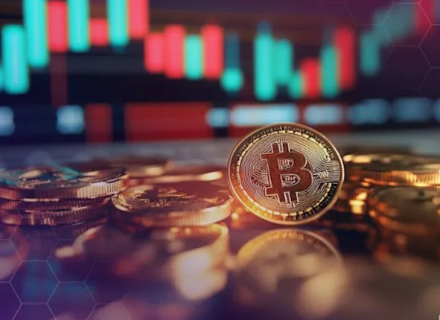Bitcoin News Today: Bitcoin Redefines Finance, Stepping Beyond Gold’s Shadow
- Bitcoin diverges from gold as a distinct asset class, driven by institutional adoption and digital financial integration. - Norway’s sovereign wealth fund boosted Bitcoin exposure by 83% in Q2 2025, signaling strategic asset recognition. - U.S. Fed’s crypto bank program shutdown and ETF approvals highlight regulatory shifts toward digital asset normalization. - GM30 index (23.2% Bitcoin weight) and divergent ETF flows underscore Bitcoin’s unique role in digital ecosystems. - Market volatility and distinc
Bitcoin no longer plays gold’s game as the cryptocurrency increasingly diverges from traditional safe-haven assets in both function and perception. While gold has long been considered a hedge against inflation and economic uncertainty, Bitcoin is carving out a distinct identity, particularly within financial markets and institutional investment strategies. This divergence has been underscored by recent developments in the U.S. and global markets, where Bitcoin is being integrated into financial instruments that align more closely with equities and digital asset ecosystems than with traditional commodities [1].
Institutional adoption of Bitcoin continues to accelerate, as evidenced by the recent actions of major investors and financial institutions . Norway’s sovereign wealth fund, for instance, increased its Bitcoin exposure by 83% in the second quarter of 2025, according to a report by Standard Chartered [1]. This move highlights a shift in perception, where Bitcoin is increasingly viewed as a strategic asset rather than a speculative one. Additionally, the continued development and approval of Bitcoin ETFs signal a broader acceptance of the cryptocurrency within conventional financial frameworks.
Meanwhile, Bitcoin’s performance in the market is being measured against new benchmarks and indices rather than traditional ones like gold. For example, the GM30 index, which tracks the top 30 tokens by market capitalization, shows Bitcoin at 23.2% weight, underscoring its role as the leading digital asset rather than a stand-in for gold [1]. This index-based representation reinforces the idea that Bitcoin is not merely a new form of gold, but a foundational asset in a separate class of financial instruments.
The regulatory environment also plays a critical role in this evolution. In a move reflecting broader regulatory shifts, the U.S. Federal Reserve recently shut down its crypto bank supervision program. This decision could influence how financial institutions approach Bitcoin and other cryptocurrencies, potentially shifting the focus from regulatory caution to a more integrated model where digital assets are treated on par with traditional securities [1]. The absence of a dedicated oversight mechanism for crypto banks might encourage innovation in digital asset management but could also introduce new risks into the financial system.
Market data and investor behavior further support the idea that Bitcoin is diverging from gold. Recent outflows from both Bitcoin and Ethereum ETFs following a record volume week indicate a dynamic and volatile market, but one that is distinct from the more stable, long-term investment profile of gold. Additionally, the strong inflows into Ethereum ETFs contrast with Bitcoin’s performance, suggesting that while both assets are part of the digital ecosystem, they are attracting different investor profiles [1].
Overall, the growing institutional interest, evolving regulatory landscape, and distinct market behavior of Bitcoin suggest that it is no longer competing in the same category as gold. Instead, it is establishing itself as a unique asset class, with implications for portfolio diversification, risk management, and investment strategies in both traditional and digital financial systems. This repositioning is not just a shift in perception—it is a fundamental transformation in the role and function of digital assets in global finance.
Source:

Disclaimer: The content of this article solely reflects the author's opinion and does not represent the platform in any capacity. This article is not intended to serve as a reference for making investment decisions.
You may also like
Crypto: How Europe Wants to Enforce Its Version of the SEC

Stablecoin : Western Union plans to launch anti-inflation "stable cards"

Mars Morning News | SEC Expected to Issue "Innovation Exemptions" for the Crypto Industry in "About a Month"
The SEC is expected to issue an innovation exemption for the crypto industry. The UK "Digital Assets and Other Property Act" has come into effect. BlackRock's CEO revealed that sovereign wealth funds are buying bitcoin. Bank of America recommends clients allocate to crypto assets. Bitcoin selling pressure is nearing its end. Summary generated by Mars AI. The accuracy and completeness of this summary are still being improved as the Mars AI model continues to iterate.

a16z: Inefficient governance and dormant tokens pose a more severe quantum threat to BTC.